Origin Read online
Page 15
Prince Julian nodded absently.
"The shooter is being tracked," Garza said, attempting to change the subject. "Fonseca assures me they will have the terrorist in custody soon." He used the word "terrorist" intentionally in hopes of snapping the prince out of his daze.
But the prince only gave another blank nod.
"The president has denounced the assassination," Garza continued, "but the government does hope that you will further comment ... considering Ambra's involvement with the event." Garza paused. "I realize the situation is awkward, given your engagement, but I would suggest you simply say that one of the things you most admire in your fiancee is her independence, and while you know she doesn't share the political views of Edmond Kirsch, you applaud her standing by her commitments as director of the museum. I'd be happy to write something for you, if you like? We should make a statement in time for the morning news cycle."
Julian's gaze never left the window. "I'd like to get Bishop Valdespino's input on any statement we make."
Garza clenched his jaw and swallowed his disapproval. Post-Franco Spain was an estado aconfesional, meaning it no longer had a state religion, and the Church was not supposed to have any involvement in political matters. Valdespino's close friendship with the king, however, had always afforded the bishop an unusual amount of influence in the daily affairs of the palace. Unfortunately, Valdespino's hard-line politics and religious zeal left little room for the diplomacy and tact that were required to handle tonight's crisis.
We need nuance and finesse--not dogma and fireworks!
Garza had learned long ago that Valdespino's pious exterior concealed a very simple truth: Bishop Valdespino always served his own needs before those of God. Until recently, it was something Garza could ignore, but now, with the balance of power shifting in the palace, the sight of the bishop sidling up to Julian was a cause for significant concern.
Valdespino is too close to the prince as it is.
Garza knew that Julian had always considered the bishop "family"--more of a trusted uncle than a religious authority. As the king's closest confidant, Valdespino had been tasked with overseeing young Julian's moral development, and he had done so with dedication and fervor--vetting all of Julian's tutors, introducing him to the doctrines of faith, and even advising him on matters of the heart. Now, years later, even when Julian and Valdespino did not see eye to eye, their bond remained blood-deep.
"Don Julian," Garza said in a calm tone, "I feel strongly that tonight's situation is something you and I should handle alone."
"Is it?" declared a man's voice in the darkness behind him.
Garza spun around, stunned to see a robed ghost seated in the shadows.
Valdespino.
"I must say, Commander," Valdespino hissed, "I figured that you of all people would realize how much you need me tonight."
"This is a political situation," Garza stated firmly, "not a religious one."
Valdespino scoffed. "The fact that you can make such a statement tells me that I have grossly overestimated your political acumen. If you would like my opinion, there is only one appropriate response to this crisis. We must immediately assure the nation that Prince Julian is a deeply religious man, and that Spain's future king is a devout Catholic."
"I agree ... and we will include a mention of Don Julian's faith in any statement he makes."
"And when Prince Julian appears before the press, he will need me at his side, with my hand on his shoulder--a potent symbol of the strength of his bond with the Church. That single image will do more to reassure the nation than any words you can write."
Garza bristled.
"The world has just witnessed a brutal live assassination on Spanish soil," Valdespino declared. "In times of violence, nothing comforts like the hand of God."
CHAPTER 31
THE SZECHENYI CHAIN Bridge--one of eight bridges in Budapest--spans more than a thousand feet across the Danube. An emblem of the link between East and West, the bridge is considered one of the most beautiful in the world.
What am I doing? wondered Rabbi Koves, peering over the railing into the swirling black waters below. The bishop advised me to stay at home.
Koves knew he shouldn't have ventured out, and yet whenever he felt unsettled, something about the bridge had always pulled at him. For years, he'd walked here at night to reflect while he admired the timeless view. To the east, in Pest, the illuminated facade of Gresham Palace stood proudly against the bell towers of Szent Istvan Bazilika. To the west, in Buda, high atop Castle Hill, rose the fortified walls of Buda Castle. And northward, on the banks of the Danube, stretched the elegant spires of the parliament building, the largest in all of Hungary.
Koves suspected, however, that it was not the view that continually brought him to Chain Bridge. It was something else entirely.
The padlocks.
All along the bridge's railings and suspension wires hung hundreds of padlocks--each bearing a different pair of initials, each locked forever to the bridge.
Tradition was that two lovers would come together on this bridge, inscribe their initials on a padlock, secure the lock to the bridge, and then throw the key into the deep water, where it would be lost forever--a symbol of their eternal connection.
The simplest of promises, Koves thought, touching one of the dangling locks. My soul is locked to your soul, forever.
Whenever Koves needed to be reminded that boundless love existed in the world, he would come to see these locks. Tonight felt like one of those nights. As he stared down into the swirling water, he felt as if the world were suddenly moving far too fast for him. Perhaps I don't belong here anymore.
What had once been life's quiet moments of solitary reflection--a few minutes alone on a bus, or walking to work, or waiting for an appointment--now felt unbearable, and people impulsively reached for their phones, their earbuds, and their games, unable to fight the addictive pull of technology. The miracles of the past were fading away, whitewashed by a ceaseless hunger for all-that-was-new.
Now, as Yehuda Koves stared down into the water, he felt increasingly weary. His vision seemed to blur, and he began to see eerie, amorphous shapes moving beneath the water's surface. The river suddenly looked like a churning stew of creatures coming to life in the deep.
"A viz el," a voice said behind him. "The water is alive."
The rabbi turned and saw a young boy with curly hair and hopeful eyes. The boy reminded Yehuda of himself in younger years.
"I'm sorry?" the rabbi said.
The boy opened his mouth to speak, but instead of language, an electronic buzzing noise issued from his throat and a blinding white light flashed from his eyes.
Rabbi Koves awoke with a gasp, sitting bolt upright in his chair.
"Oy gevalt!"
The phone on his desk was blaring, and the old rabbi spun around, scanning the study of his haziko in a panic. Thankfully, he was entirely alone. He could feel his heart pounding.
Such a strange dream, he thought, trying to catch his breath.
The phone was insistent, and Koves knew that at this hour it had to be Bishop Valdespino, calling to provide him with an update on his transportation to Madrid.
"Bishop Valdespino," the rabbi answered, still feeling disoriented. "What is the news?"
"Rabbi Yehuda Koves?" an unfamiliar voice inquired. "You don't know me, and I don't want to frighten you, but I need you to listen to me carefully."
Koves was suddenly wide-awake.
The voice was female but was masked somehow, sounding distorted. The caller spoke in rushed English with a slight Spanish accent. "I'm filtering my voice for privacy. I apologize for that, but in a moment, you will understand why."
"Who is this?!" Koves demanded.
"I am a watchdog--someone who does not appreciate those who try to conceal the truth from the public."
"I ... don't understand."
"Rabbi Koves, I know you attended a private meeting with Edmond Kirsch, Bishop Vald
espino, and Allamah Syed al-Fadl three days ago at the Montserrat monastery."
How does she know this?!
"In addition, I know Edmond Kirsch provided the three of you with extensive information about his recent scientific discovery ... and that you are now involved in a conspiracy to conceal it."
"What?!"
"If you do not listen to me very carefully, then I predict you will be dead by morning, eliminated by the long arm of Bishop Valdespino." The caller paused. "Just like Edmond Kirsch and your friend Syed al-Fadl."
CHAPTER 32
BILBAO'S LA SALVE Bridge crosses the Nervion River in such close proximity to the Guggenheim Museum that the two structures often have the appearance of being fused into one. Immediately recognizable by its unique central support--a towering, bright red strut shaped like a giant letter H--the bridge takes the name "La Salve" from folkloric tales of sailors returning from sea along this river and saying prayers of gratitude for their safe arrival home.
After exiting the rear of the building, Langdon and Ambra had quickly covered the short distance between the museum and the riverbank and were now waiting, as Winston had requested, on a walkway in the shadows directly beneath the bridge.
Waiting for what? Langdon wondered, uncertain.
As they lingered in the darkness, he could see Ambra's slender frame shivering beneath her sleek evening dress. He removed his tails jacket and placed it around her shoulders, smoothing the fabric down her arms.
Without warning, she suddenly turned and faced him.
For an instant, Langdon feared he had overstepped a boundary, but Ambra's expression was not one of displeasure, but rather one of gratitude.
"Thank you," she whispered, gazing up at him. "Thank you for helping me."
With her eyes locked on his, Ambra Vidal reached out, took Langdon's hands, and clasped them in her own, as if she were trying to absorb any warmth or comfort he could offer.
Then, just as quickly, she released them. "Sorry," she whispered. "Conducta impropia, as my mother would say."
Langdon gave her a reassuring grin. "Extenuating circumstances, as my mother would say."
She managed a smile, but it was short-lived. "I feel absolutely ill," she said, glancing away. "Tonight, what happened to Edmond ..."
"It's appalling ... dreadful," Langdon said, knowing he was still too much in shock to express his emotions fully.
Ambra was staring at the water. "And to think that my fiance, Don Julian, is involved ..."
Langdon could hear the betrayal in her voice and was uncertain how to reply. "I realize how it appears," he said, treading lightly on this delicate ground, "but we really don't know that for sure. It's possible Prince Julian had no advance notice about the killing tonight. The assassin could have been acting alone, or working for someone other than the prince. It makes little sense that the future king of Spain would orchestrate the public assassination of a civilian--especially one traceable directly back to him."
"It's only traceable because Winston figured out that Avila was a late addition to the guest list. Maybe Julian thought nobody would ever figure out who pulled the trigger."
Langdon had to admit she had a point.
"I never should have discussed Edmond's presentation with Julian," Ambra said, turning back to him. "He was urging me not to participate, and so I tried to reassure him that my involvement would be minimal, that it was all nothing but a video screening. I think I even told Julian that Edmond was launching his discovery from a smartphone." She paused. "Which means, if they see that we took Edmond's phone, they'll realize that his discovery can still be broadcast. And I really don't know how far Julian will go to interfere."
Langdon studied the beautiful woman a long moment. "You don't trust your fiance at all, do you?"
Ambra took a deep breath. "The truth is, I don't know him as well as you might assume."
"Then why did you agree to marry him?"
"Quite simply, Julian put me in a position where I had no choice."
Before Langdon could respond, a low rumble began shaking the cement beneath their feet, reverberating through the grotto-like space beneath the bridge. The sound grew louder and louder. It seemed to be coming from up the river, to their right.
Langdon turned and saw a dark shape speeding toward them--a powerboat approaching with no running lights. As it neared the high cement bank, it slowed and began to glide up perfectly beside them.
Langdon stared down at the craft and shook his head. Until this moment, he had been unsure how much faith to place in Edmond's computerized docent, but now, seeing a yellow water taxi approaching the bank, he realized that Winston was the best ally they could possibly have.
The disheveled captain waved them aboard. "Your British man, he call me," the man said. "He say VIP client pay triple for ... how you say ... velocidad y discrecion? I do it--you see? No lights!"
"Yes, thank you," Langdon replied. Good call, Winston. Speed and discretion.
The captain reached out and helped Ambra aboard, and as she disappeared into the small covered cabin to get warm, he gave Langdon a wide-eyed smile. "This my VIP? Senorita Ambra Vidal?"
"Velocidad y discrecion," Langdon reminded him.
"!Si, si! Okay!" The man scurried to the helm and revved the engines. Moments later, the powerboat was skimming westward through the darkness along the Nervion River.
Off the port side of the boat, Langdon could see the Guggenheim's giant black widow, eerily illuminated by the spinning lights of police cars. Overhead, a news chopper streaked across the sky toward the museum.
The first of many, Langdon suspected.
Langdon pulled Edmond's cryptic note card from his pants pocket. BIO-EC346. Edmond had told him to give it to a taxi driver, although Edmond probably never imagined the vehicle would be a water taxi.
"Our British friend ...," Langdon yelled to the driver over the sound of the roaring engines. "I assume he told you where we are going?"
"Yes, yes! I warn him by boat I can take you only almost there, but he say no problem, you walk three hundred meters, no?"
"That's fine. And how far is it from here?"
The man pointed to a highway that ran along the river on the right. "Road sign say seven kilometers, but in boat, a little more."
Langdon glanced out at the illuminated highway sign.
AEROPUERTO BILBAO (BIO) 7 KM
He smiled ruefully at the sound of Edmond's voice in his mind. It's a painfully simple code, Robert. Edmond was right, and when Langdon had finally figured it out earlier tonight, he had been embarrassed that it had taken him so long.
BIO was indeed a code--although it was no more difficult to decipher than similar codes from around the world: BOS, LAX, JFK.
BIO is the local airport code.
The rest of Edmond's code had fallen into place instantly.
EC346.
Langdon had never seen Edmond's private jet, but he knew the plane existed, and he had little doubt that the country code for a Spanish jet's tail number would start with the letter E for Espana.
EC346 is a private jet.
Clearly, if a cabdriver had taken him to Bilbao Airport, Langdon could have presented Edmond's card to security and been escorted directly to Edmond's private plane.
I hope Winston reached the pilots to warn them we are coming, Langdon thought, looking back in the direction of the museum, which was growing smaller and smaller in their wake.
Langdon considered going inside the cabin to join Ambra, but the fresh air felt good, and he decided to give her a couple of minutes alone to gather herself.
I could use a moment too, he thought, moving toward the bow.
At the front of the boat, with the wind whipping through his hair, Langdon untied his bow tie and pocketed it. Then he released the top button of his wingtip collar and breathed as deeply as he could, letting the night air fill his lungs.
Edmond, he thought. What have you done?
CHAPTER 33
&nb
sp; COMMANDER DIEGO GARZA was fuming as he paced the darkness of Prince Julian's apartment and endured the bishop's self-righteous lecture.
You are trespassing where you do not belong, Garza wanted to shout at Valdespino. This is not your domain!
Once again, Bishop Valdespino had inserted himself into palace politics. Having materialized like a specter in the darkness of Julian's apartment, Valdespino was adorned in full ecclesiastical vestments and was now giving an impassioned sermon to Julian about the importance of Spain's traditions, the devoted religiosity of past kings and queens, and the comforting influence of the Church in times of crisis.
This is not the moment, Garza seethed.
Tonight, Prince Julian would need to deliver a delicate public relations performance, and the last thing Garza needed was to have him distracted by Valdespino's attempts to impose a religious agenda.
The buzz of Garza's phone conveniently interrupted the bishop's monologue.
"Si, dime," Garza answered loudly, positioning himself between the prince and the bishop. "?Que tal va?"
"Sir, it's Agent Fonseca in Bilbao," the caller said in rapid-fire Spanish. "I'm afraid we've been unable to capture the shooter. The car company we thought could track him has lost contact. The shooter seems to have anticipated our actions."
Garza swallowed his anger and exhaled calmly, trying to ensure that his voice would reveal nothing about his true state of mind. "I understand," he replied evenly. "At the moment, your only concern is Ms. Vidal. The prince is waiting to see her, and I've assured him that you'll have her here shortly."
There was a long silence on the line. Too long.
"Commander?" Fonseca asked, sounding tentative. "I'm sorry, sir, but I have bad news on that front. It appears that Ms. Vidal and the American professor have left the building"--he paused--"without us."
Garza almost dropped his phone. "I'm sorry, can you ... repeat that?"
"Yes, sir. Ms. Vidal and Robert Langdon have fled the building. Ms. Vidal intentionally abandoned her phone so we would be unable to track her. We have no idea where they've gone."
Garza realized his jaw had fallen slack, and the prince was now staring at him with apparent concern. Valdespino was also leaning in to hear, his eyebrows arched with unmistakable interest.
"Ah--that's excellent news!" Garza blurted suddenly, nodding with conviction. "Good work. We'll see you all here later this evening. Let's just confirm transport protocols and security. One moment, please."

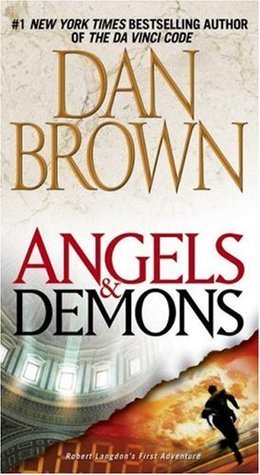 Angels & Demons
Angels & Demons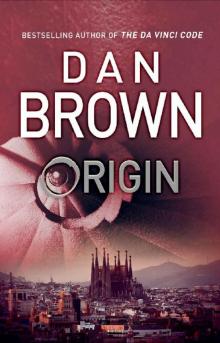 Origin
Origin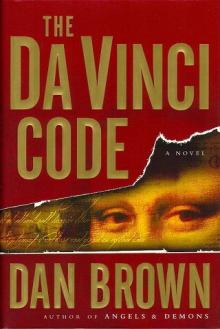 The Da Vinci Code
The Da Vinci Code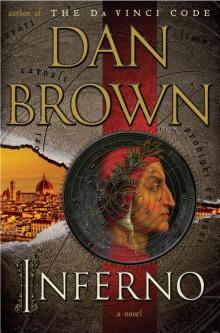 Inferno
Inferno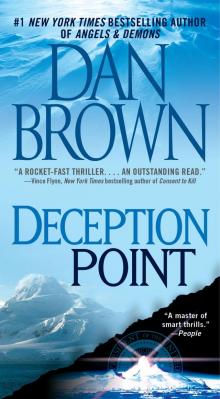 Deception Point
Deception Point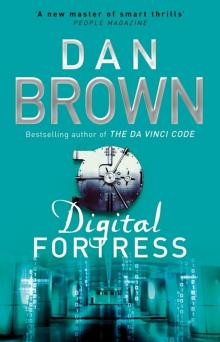 Digital Fortress
Digital Fortress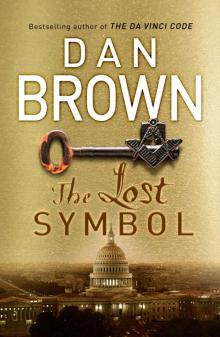 The Lost Symbol
The Lost Symbol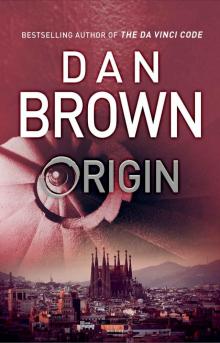 Origin: (Robert Langdon Book 5)
Origin: (Robert Langdon Book 5)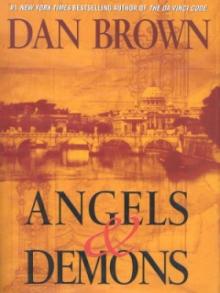 Angles & Demons
Angles & Demons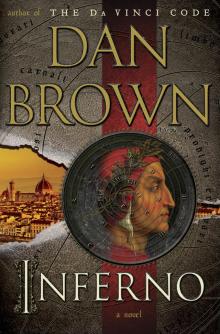 Inferno: A Novel
Inferno: A Novel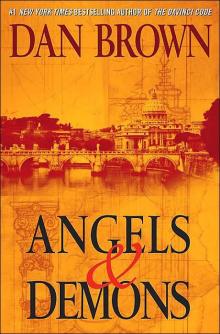 Angels & Demons rl-1
Angels & Demons rl-1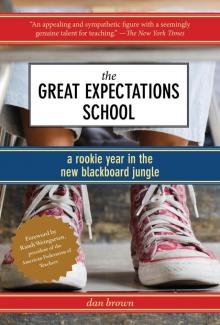 The Great Expectations School
The Great Expectations School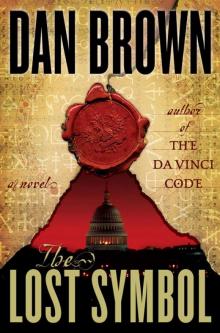 The Lost Symbol rl-3
The Lost Symbol rl-3 Angels and Demons
Angels and Demons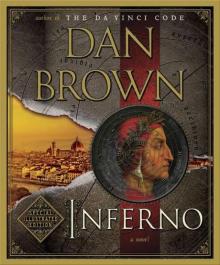 Inferno: Special Illustrated Edition: Featuring Robert Langdon
Inferno: Special Illustrated Edition: Featuring Robert Langdon